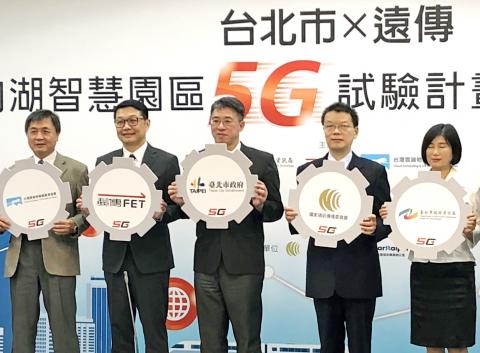Far EasTone Telecommunications Co Ltd (遠傳電信) yesterday said it plans to set up an indoor 5G trial field next month at Neihu Technology Park (內湖科技園區) for 100 enterprises or research organizations to run three-month free trials, a day after the telecom won the first approval to install a 5G-based Proof of Business network.
The telecom said it plans to offer the trials in collaboration with Ericsson Taiwan (台灣愛立信) at the Neihu Sports Center on a commercial 5G network using the 3.5 gigahertz band.
As part of the trials, the telecom is to supply free 5G SIM cards, routers and an application enablement platform, allowing firms to utilize it to test Internet of Things (IoT) business opportunities from this month to December.

Photo: CNA
The average download speed of the 5G network is at least 10 times faster than a 4G LTE network, the company said.
“We hope the trials help upstream and downstream companies transit to 5G technology more smoothly,” Far EasTone vice president Philip Tseng (曾詩淵) told reporters on the sidelines of a news conference in Taipei.
The telecom is teaming up with Taipei’s Smart City Project Management Office, Department of Information Technology and Department of Economic Development, as well as the Taiwan IOT Technology and Industry Association (台灣物聯網產業技術協會) to launch the 5G trials.
Notebook computer maker Compal Electronics Inc (仁寶電腦) and smartphone maker HTC Corp (宏達電) are to provide the testing ground, the telecom said.
The announcement came after the National Communications Commission on Thursday approved Far EasTone’s plan to deploy a 5G proof-of-business network.
The commission has approved six 5G proof-of-concept trials and is still reviewing other applications, it said, adding that it welcomes more applications to explore business opportunities or business models on 5G networks.
Telecoms that win 5G spectrum licenses are expected to launch commercial 5G services in July next year at the earliest, the commission said.

KEEPING UP: The acquisition of a cleanroom in Taiwan would enable Micron to increase production in a market where demand continues to outpace supply, a Micron official said Micron Technology Inc has signed a letter of intent to buy a fabrication site in Taiwan from Powerchip Semiconductor Manufacturing Corp (力積電) for US$1.8 billion to expand its production of memory chips. Micron would take control of the P5 site in Miaoli County’s Tongluo Township (銅鑼) and plans to ramp up DRAM production in phases after the transaction closes in the second quarter, the company said in a statement on Saturday. The acquisition includes an existing 12 inch fab cleanroom of 27,871m2 and would further position Micron to address growing global demand for memory solutions, the company said. Micron expects the transaction to

Vincent Wei led fellow Singaporean farmers around an empty Malaysian plot, laying out plans for a greenhouse and rows of leafy vegetables. What he pitched was not just space for crops, but a lifeline for growers struggling to make ends meet in a city-state with high prices and little vacant land. The future agriculture hub is part of a joint special economic zone launched last year by the two neighbors, expected to cost US$123 million and produce 10,000 tonnes of fresh produce annually. It is attracting Singaporean farmers with promises of cheaper land, labor and energy just over the border.

US actor Matthew McConaughey has filed recordings of his image and voice with US patent authorities to protect them from unauthorized usage by artificial intelligence (AI) platforms, a representative said earlier this week. Several video clips and audio recordings were registered by the commercial arm of the Just Keep Livin’ Foundation, a non-profit created by the Oscar-winning actor and his wife, Camila, according to the US Patent and Trademark Office database. Many artists are increasingly concerned about the uncontrolled use of their image via generative AI since the rollout of ChatGPT and other AI-powered tools. Several US states have adopted

A proposed billionaires’ tax in California has ignited a political uproar in Silicon Valley, with tech titans threatening to leave the state while California Governor Gavin Newsom of the Democratic Party maneuvers to defeat a levy that he fears would lead to an exodus of wealth. A technology mecca, California has more billionaires than any other US state — a few hundred, by some estimates. About half its personal income tax revenue, a financial backbone in the nearly US$350 billion budget, comes from the top 1 percent of earners. A large healthcare union is attempting to place a proposal before